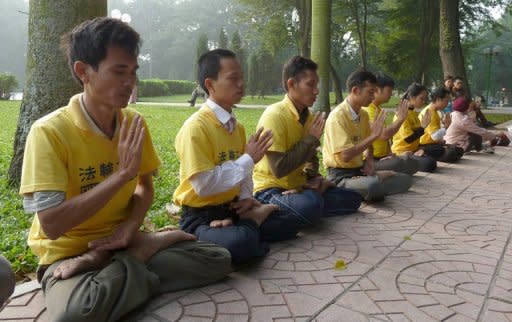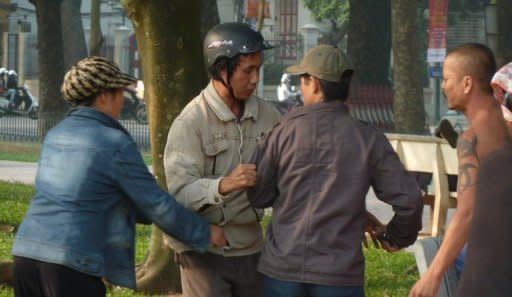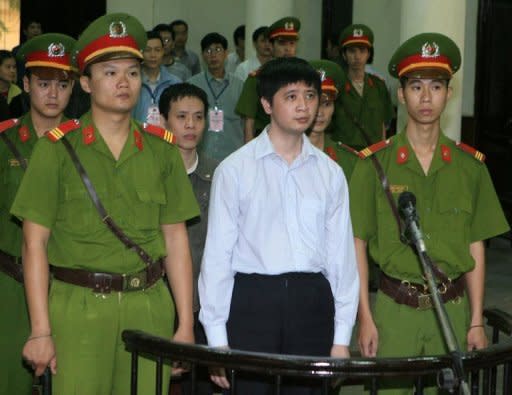Vietnam's Falungong under pressure
In silent meditation, the Falungong members did not flinch when a shirtless, tattooed man slapped them on the head, or when a burly female security agent dragged a dried palm leaf across their faces. Vietnamese practitioners of Falungong -- a Buddhist-inspired traditional Chinese spiritual discipline practised in more than 70 countries.-- say treatment like this has become routine. They say communist authorities in Hanoi have bowed to pressure from China, using police and hired thugs to harass, assault and detain members of the movement. Their plight has been highlighted with the jailing by a Hanoi court in early November of two Vietnamese Falungong members. The pair were convicted and jailed for two and three years respectively for beaming Falungong-linked radio broadcasts into China, where the movement is banned and labelled an "evil cult". Before and after the verdict, local Falungong have held several meditation protests opposite the Chinese embassy to object to alleged abuses of its members in China, and to support their two detained associates in Vietnam. "We want justice and human rights from the Chinese authorities," said Nguyen Doan Kien, who has practised Falungong since 2008. "We want the Chinese government to remove its pressure on the Vietnamese government so our fellow students can be released." Vietnam is a largely Buddhist nation and the government says it always respects the freedom of belief and religion. But religious activity remains under state control and some groups have complained of ill treatment. The Unified Buddhist Church has been banned since the early 1980s when it refused to join the state-sanctioned Vietnam Buddhist Church, while Roman Catholics have a long-running dispute over the seizure of church lands. Falungong has had followers in Vietnam for around a decade, said Kien, 28, and there are now two or three thousand, mostly based in the country's two main cities, Hanoi and Ho Chi Minh City. But a government spokesman said the group "has not been recognised in Vietnam." Falungong followers typically gather in city parks to meditate together and perform the movement's physical exercises which resemble Tai-chi. They have also conducted meditation protests in front of China's diplomatic missions. AFP witnessed one protest on November 24. Up to 16 people, most wearing yellow T-shirts bearing Falungong slogans, formed a line in a park across from the entrance to Beijing's embassy. Adopting a Buddhist-style pose, they sat cross-legged, silent, with eyes closed and one hand raised vertically below their face. Within 20 minutes, plainclothes agents dragged away one Falungong protestor who had photographed his meditating colleagues, threw him to the ground on a nearby public square and kicked him. AFP was prevented from filming the incident by another plainclothes officer. Then a shirtless man crouched down, talked to the meditating individuals and started slapping their heads before a woman with a hard, dried palm leaf went to work, dragging the leaf across the Falungong members' faces. A witness said the Falungong dispersed after about an hour when some were dragged to the public square while others got up and left on their own. Later that day, Kien said "we were beaten less" than before. "In Hanoi we have suffered a lot of pressure from the police, and several times they took us back to the police station," he said. "I have been beaten several times. But it's our practice not to retaliate." Another Falungong follower, Pham Xuan Giao, said he was among almost two dozen individuals who came to Hanoi from other parts of the country to show support for the two jailed followers. "I personally have been arrested about seven or eight times" since 2009, he said. The detentions usually last about 12 hours said Giao, 38, who lives in Ho Chi Minh City and has been a Falungong practitioner for three years. A mechanical engineer, Giao alleges he was sacked from his job with a foreign-owned coffee producer after he was detained by police who seized his laptop and accused Falungong of being an "illegal religion" earlier this year. "I am suspicious that they received pressure from the police or the authorities to sack me," he said. Carl Thayer, an Australia-based Vietnam analyst, said that in acting against the Falungong, Vietnam have buckled under Beijing's might. "Vietnam has succumbed to Chinese pressure," he said. China's communist government banned Falungong in 1999 after thousands of practitioners silently converged in Beijing to air grievances, showing the organisational strength of a movement which the government last year called an "anti-human, anti-society and anti-science cult". Vietnamese frequently voice dislike of China, which occupied their country for 1,000 years, but China today is Vietnam's largest trading partner. Vietnam's Ministry of Foreign Affairs spokesman, Luong Thanh Nghi, did not directly respond to allegations about Chinese pressure but said he did not believe Falungong were subjected to physical abuse. He said their gatherings were broken up by the police "because they violate the social order and security."




